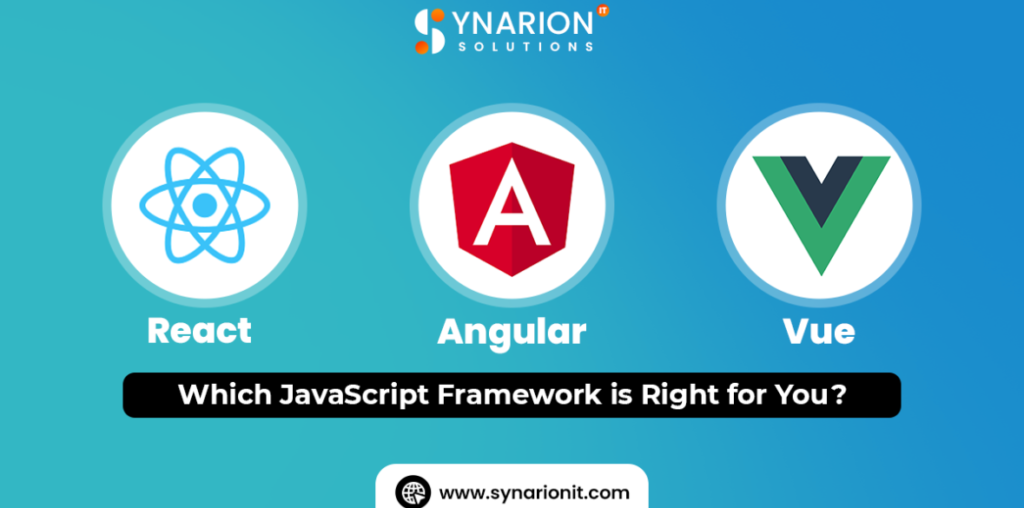In the world of modern web development, choosing the right JavaScript framework can be a daunting task. React, Angular, and Vue are three of the most popular options available today, each with its unique features, advantages, and use cases. But how do you determine which framework is the best fit for your project? In this article, we will compare React, Angular, and Vue to help you make an informed decision on which framework to choose. Additionally, we’ll discuss how you can hire Java developers or hire a dedicated Angular developer to help you implement your chosen framework.
1. React: The Flexible, Component-Based Framework
React is a library developed by Facebook that focuses on building user interfaces with reusable components. It’s not a full-fledged framework like Angular but rather a library for creating fast, interactive UIs. React has gained widespread popularity due to its flexibility, rich ecosystem, and the large community that supports it.
Pros of React:
- Component-based architecture: React uses reusable components, which leads to cleaner code and faster development.
- Virtual DOM: React improves performance with its virtual DOM, making it faster than traditional JavaScript DOM manipulation.
- Flexibility: React is more of a “library” than a framework, which gives developers the freedom to choose other tools or libraries for routing, state management, etc.
- Large Ecosystem: With extensive libraries and tools available, React can be integrated into almost any project, whether it’s a small website or a large-scale web application.
When to Choose React:
- If you need a highly interactive and dynamic user interface.
- If your project demands scalability and flexibility.
- If you are building a Single Page Application (SPA) or need a mobile app using React Native.
Hiring React Developers:
If you decide that React is the right choice for your project, you’ll need to hire Java developers with expertise in React. A developer with experience in React can help you build fast, scalable, and high-performance applications that deliver exceptional user experiences.
2. Angular: The Complete, Opinionated Framework
Angular is a full-fledged front-end framework developed and maintained by Google. It’s designed to provide a comprehensive solution for building dynamic web applications and is often favored for enterprise-level projects due to its rich feature set and robust structure.
Pros of Angular:
- Full-Featured Framework: Angular provides everything you need out-of-the-box, including tools for routing, state management, and form handling.
- Two-way data binding: Angular uses two-way data binding, meaning that any changes in the UI are automatically reflected in the data model, and vice versa.
- Modular Development: Angular’s modular structure makes it easy to organize code and scale applications.
- Strong Community & Support: As a framework backed by Google, Angular has strong community support, plenty of resources, and regular updates.
When to Choose Angular:
- If you are building a large-scale, complex application, especially for enterprise use.
- If you prefer a complete, opinionated framework that provides most of the features you need out-of-the-box.
- If you require robust tooling for testing, forms, HTTP requests, and more.
Hiring Dedicated Angular Developers:
If you need an Angular-based solution, it’s essential to hire a dedicated Angular developer with in-depth knowledge of the framework. A skilled developer will be able to create scalable, maintainable applications, making Angular a solid choice for complex projects.
3. Vue: The Progressive Framework with Simplicity and Flexibility
Vue.js is a progressive JavaScript framework that is designed to be incrementally adoptable. Vue has gained significant traction in recent years due to its simplicity, ease of integration, and small learning curve compared to Angular.
Pros of Vue:
- Easy Learning Curve: Vue is relatively easy to pick up for beginners, especially if you have experience with HTML, CSS, and JavaScript.
- Flexibility: Like React, Vue is also flexible, allowing developers to scale it up with additional libraries and tools as needed.
- Small Bundle Size: Vue’s small file size makes it great for performance optimization, particularly for mobile apps and websites where speed matters.
- Great Documentation: Vue’s documentation is clear, comprehensive, and beginner-friendly, making it easier for developers to get started.
When to Choose Vue:
- If you need a lightweight, flexible framework that’s easy to integrate into an existing project.
- If you are building a smaller-scale application or prototype.
- If you prefer a gentle learning curve but want the ability to scale as your project grows.
Hiring Vue Developers:
If Vue is your framework of choice, hiring an experienced Vue developer is key to ensuring your project’s success. With the right expertise, your developer can efficiently create dynamic, high-performance applications with Vue’s lightweight architecture.
How to Choose the Right Framework for Your Project
Choosing the right JavaScript framework depends on several factors such as:
- Project Complexity: For large-scale, enterprise-level applications, Angular is often the best choice due to its all-in-one nature. For smaller projects or applications with dynamic UIs, React or Vue might be more suitable.
- Team Expertise: If your team is already familiar with one of the frameworks, that could be a deciding factor. For example, if your team has extensive experience with TypeScript and large-scale applications, Angular might be the way to go.
- Community and Ecosystem: React, Angular, and Vue all have large communities, but React and Angular have more extensive ecosystems. React might be more suitable if you prefer more control over the tools you integrate with the framework.
- Learning Curve: Vue has the lowest learning curve, making it a great choice for projects where quick development and easy adoption are key. React and Angular have steeper learning curves but are better suited for larger, more complex applications.
Conclusion
Each of the three JavaScript frameworks—React, Angular, and Vue—has its strengths and weaknesses, and the right choice depends on the specific needs of your project. Whether you want a flexible UI library like React, a comprehensive enterprise-level framework like Angular, or a simple yet powerful option like Vue, there’s a framework to suit every project.
If you’re unsure which framework to use, or if you’re looking for expert help, it’s always a good idea to hire Java developers with experience in the specific framework you want to implement. For Angular-specific projects, you can hire a dedicated Angular developer who can bring in-depth knowledge of the framework and help build robust, scalable applications tailored to your needs.




